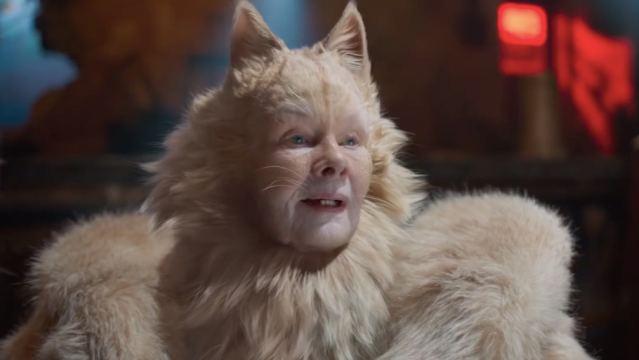In a recent interview with Out, Dame Judi Dench mused about her relationship to Cats and described how she sees her character, Old Deuteronomy as trans because the role has traditionally been portrayed by male actors. Actors really do say the darnedest things, don’t they?
Given the somewhat joking tone Dench was speaking in (you can see video of the interview on Out’s website), it’s not exactly clear how earnest she was being about the way she sees Old Deuteronomy. But let’s assume that Dench meant what she said, because joking about trans identities is a patently bad thing that one would imagine Dench knows she shouldn’t do. If Old Deuteronomy’s gender was at all explicitly addressed in Cats’ text, then the movie could have arguably been one of the most high-profile depictions of a trans-identified person in a big budget Hollywood film out this year.
But Cats doesn’t come anywhere near close to even suggesting that Old Deuteronomy is anything but a cisgender anthropomorphic cat. While it’s nice that Dench might have wanted to give the character a bit more depth, claiming that Old Deuteronomy is trans during a press junket is not the same thing as the character being canonically trans. Looking at films like Avengers: Endgame and The Rise of Skywalker, you can see that more filmmakers are finally beginning to pick up on the idea that queer representation is an important thing (even if the films absolutely fumble the ball when it comes to actually portraying the characters in meaningful, thoughtful ways).
[referenced url=” thumb=” title=” excerpt=”]
But comments like Dench’s are the perfect example of what Hollywood needs less of: hand-wavey, out-of-touch nonsense that makes it seem as if people have no idea what proper representation actually looks like. Retroactively trying to insert a bit of queer subtext into a story does little more than highlight the ways in which said story could have been better. As offensive as milquetoast depictions of queer people are, treating a character’s supposed queerness as an afterthought is infinitely worse, because the implication is that element of the character’s identity isn’t all that important an aspect of who they are.
None of this is particularly difficult to understand, which makes statements like Dench’s all the more bewildering, especially because she easily could have just, you know, not said any of what she said. It doesn’t seem as if the actress was actually trying to be glib, but regardless of what her intentions were, it’s worth stating that when people advocate for more diversity in mainstream films, this isn’t what we’re asking for in the least. Much in the same way that Dumbledore isn’t queer simply because J.K. Rowling decided to that the Harry Potter franchise would be better with a little queerbaiting, Old Deuteronomy isn’t trans just because Dench played a role that tends to go to male actors.
As has always been the case, words mean things, people, so let’s all try to be a bit more mindful about how we use them.
